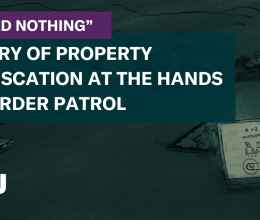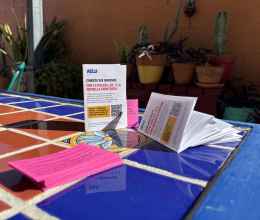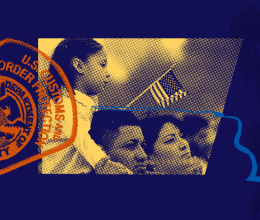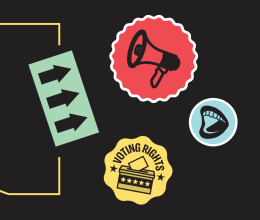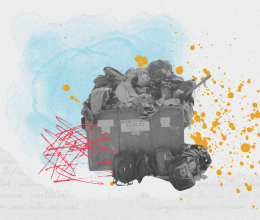
Phoenix — U.S. Customs and Border Protection (CBP) has published a groundbreaking new directive to curb longstanding inconsistencies and abuses in Border Patrol’s handling of migrants’ personal belongings. The new directive makes clear that Border Patrol is obligated to safeguard migrants’ personal belongings at holding facilities, rather than to confiscate or force people to discard their property. This policy change is a victory for immigrants’ rights and follows more than a decade of advocacy and documentation highlighting the harms caused by stripping people of their most essential and cherished belongings.
The directive requires Border Patrol to either permit migrants to retain essential belongings on their person while they are in the agency’s custody, or to hold their property and then return it. Among other changes, the new policy:
- Designates a wide range of items as “essential,” including medical items, identity and legal documents, items of religious significance, money, phones, clothing, and items of significant monetary or sentimental value.
- Sets clearer and more rigorous standards regarding the handling and replacement of non-U.S. prescribed medications.
- Requires that items serving a medical and/or disability-related purpose be retained throughout custody.
- Establishes “property custodians” at all CBP short-term holding facilities to oversee their facility property management programs.
“The dignity and rights of migrants are not disposable,” said Noah Schramm, policy strategist for the ACLU of Arizona. “While CBP’s new directive is undoubtedly a major step forward, we will continue to push for clarifying guidance to cover remaining policy gaps, as well as closely monitor the implementation of this directive to ensure that these standards are followed and are not just words on paper.”
Additional clarification is needed from CBP in some areas. While the agency has stated that migrants’ belongings must be physically returned to them upon release as a matter of course, the directive lacks express language on this rule. This risks a continuation of past abuses, where some Border Patrol facilities returned stored belongings only to people who were able to arrange travel back to remote holding facilities with claims tickets in hand. The new policy’s scope appears to be limited to short-term holding facilities, leaving open the possibility that some Border Patrol officials will continue forcing migrants to discard essential belongings before they are brought into formal processing. The ACLU and partners will continue to advocate with CBP for clearer, stronger standards in these areas.
“The Biden administration's new property confiscation policy is an important and welcome step towards ensuring our immigration system treats people seeking a better life with the dignity and respect they deserve,” said Mike Zamore, national director of policy and government affairs at the ACLU. “This new directive is also a testament to the power of collective advocacy from partners, the ACLU and our border affiliates. Policies that punish people by trashing essential medications and other precious items have no place in our country.”
The most recent advocacy efforts were led by the ACLU and the ACLU of Arizona, joined by the ACLU affiliates in New Mexico, San Diego & Imperial Counties, and Texas, and in close partnership with other organizations including the Kino Border Initiative, ProtectAZ Health, The Sikh Coalition, and Jewish Family Service of San Diego. These organizations brought to light hundreds of cases where migrants had been stripped of essential belongings including medication, identity documents, and items of religious significance in a report published earlier this year. Separately, the Government Accountability Office (GAO) released its own report in May, which found radical inconsistencies across Border Patrol stations in how migrants’ personal property is handled and recommended the issuance of clarifying guidance.
With the new directive now published, the ACLU will be tracking this issue closely to ensure that this policy translates into more humane treatment for those passing through Border Patrol custody.
Read the report, “From Hope to Heartbreak: The Disturbing Reality of Border Patrol's Confiscation of Migrants' Belongings,” here.
Read CBP’s Policy Directive here.
